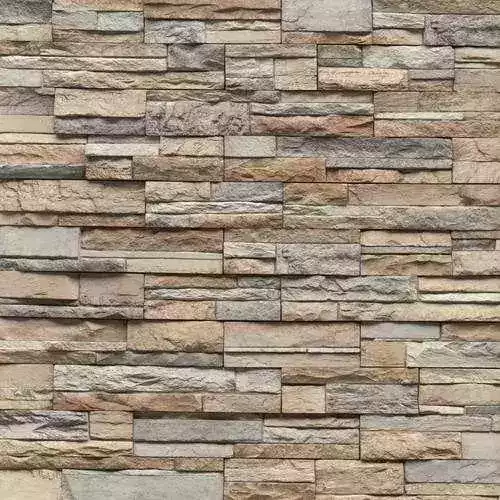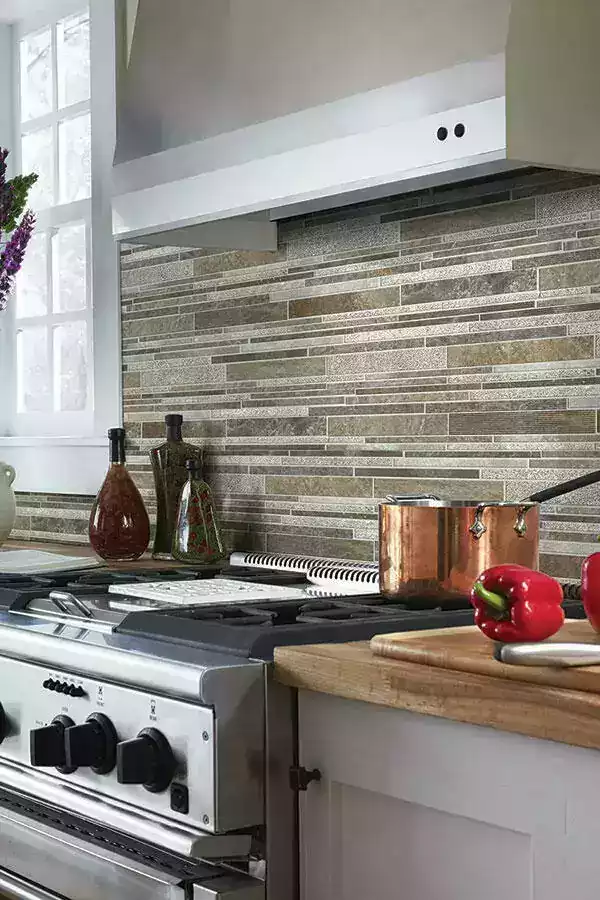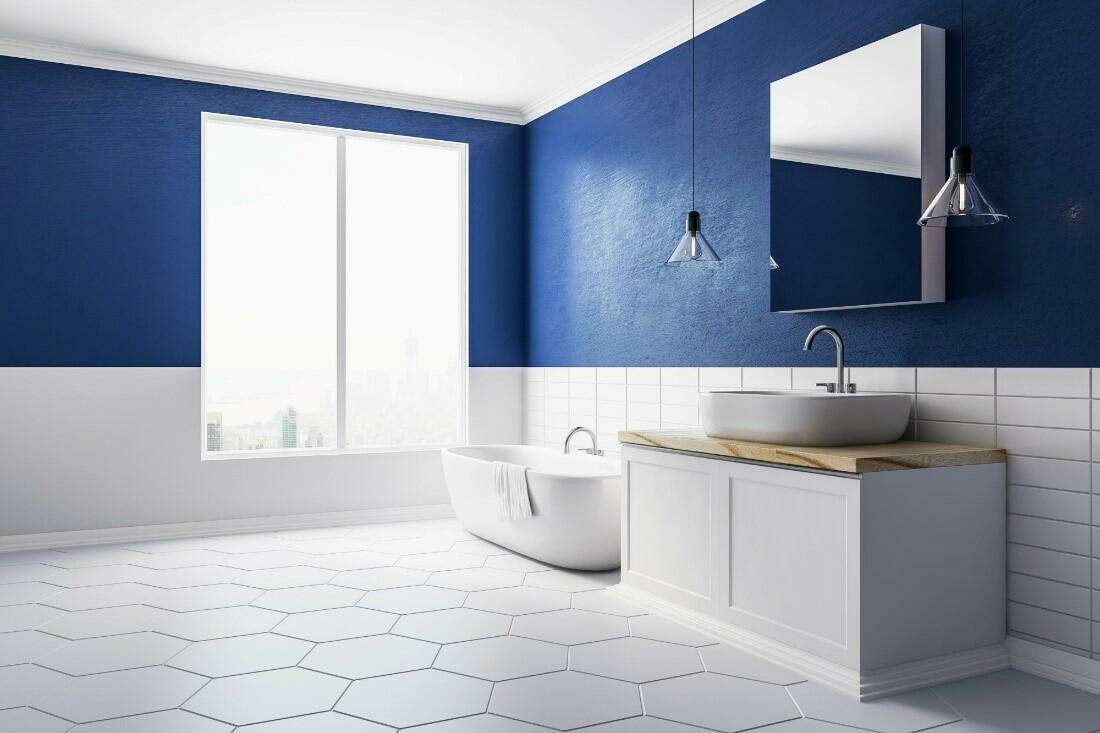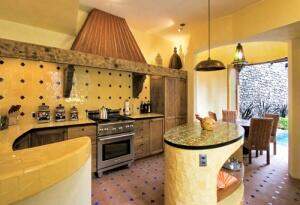When you look at a sample of stoneware tile and porcelain tile, you might not notice much of a difference. It’s nearly impossible to see the difference when the tile installation is done and only the top of the tile is visible. Using stoneware tile in the same way you would use porcelain tile can leave you with an ugly, damaged floor. So what’s the difference between ceramic and porcelain tile?
We’ve put together this guide to help you learn more about these two types of tiles. Make sure you keep reading below for some important pros and cons!
Porcelain Tile
Both porcelain and stoneware tiles are made of a clay base. However, the other ingredients involved create two different materials that have separate designs and features.
Pros
If you want to tile your floor, porcelain is by far the best choice. It will last longer than any other type of tile out there if installed correctly.
It’ll be even last in an area where it faces the elements, regular beatings from heavy items falling on it, or constant foot traffic.
Durable
It is difficult to damage properly installed porcelain tiles. Because it is stronger than all other tile materials, it does not crack easily.
As a result, you can drop heavy machinery on a porcelain floor and still have it picture-perfect when you pick it up again. This impact resistance also makes porcelain a great option for places with heavy foot traffic. For example, think of a hotel lobby or floors that tolerate heavy loads, like a garage floor.
Porcelain tiles are also very chemically resistant to degradation. This basically means that they will not wear away or dissolve if exposed to harsh chemicals like bleach or acidic lemon juice. It also means that trace amounts of its material will not get carried away on things that have touched it.
Together, these two benefits make porcelain a durable and healthy option for countertops. Really, it’s a great option to install any place you might handle food or might clean with harsh products.
Non-Absorbent
Porcelain is also nonporous, unlike stoneware tiles, which means it is completely water-resistant and non-absorbent. That means no matter where water manages to touch porcelain tile. It will not break down, dissolve, degrade, or absorb anything.
This makes it a great durable option for a building façade that needs to withstand rain and regular staining from things like pollen and dust. So if you use porcelain on the exterior of a building or your home, the only thing you will need to do to clean it will be to wipe it down from time to time.
It is a great idea to install this type of tile as outdoor flooring for the same reasons. Rainy weather will not harm the porcelain because no matter where or how it gets wet, it will not absorb water or degrade.
Imagine an outdoor patio after a flood. It is likely in this case that water will have penetrated the flooring enough to reach the underside of your tiles. If you have porcelain, there is nothing to worry about here.
Does not Freeze
Do you get a lot of cold weather in your area? You do not have to redesign your outdoor kitchen. Porcelain tile does not freeze. This means you won’t have to deal with any cracks or other damages come winter.
While porcelain tiles might cost you more upfront, you will get more out of your money than you would if you tried to put other types of tile in your yard.
Easy to Maintain
You don’t have to do much to keep your porcelain tile in good condition. All you must do is sweep it (or vacuum it) once a week. However, if your floor gets a lot of traffic, you might have to do this twice a week to keep the dirt out of your house.
It would be best to mop porcelain tiles with a mixture of vinegar and water once a month for deep cleaning. You can find other porcelain tile cleaners if you prefer, but make sure you read the instructions. The wrong solutions will only dirty your tile further, especially if they are oil-based.
Cons
The benefits listed above make porcelain tile an attractive choice for many homeowners. However, before you install it in your home, you need to think about the disadvantages as well. While these might not be a roadblock for your project, you do not want to be caught with any surprises later.
Expensive
There is no way around it. Porcelain tile is much more expensive than stoneware tile. You could end up paying double or even triple the cost for porcelain tile than you would for stoneware tile. So if you are working with a tight budget, this material might not be the right choice for you.
Heavy
Porcelain is also much heavier than stoneware. Depending on the type of porcelain tile you buy and the structure of your home, you might not be able to hang it on your wall. If you are getting it delivered to your home, you should also expect the weight to increase delivery costs.
Bad for DIY
If you are looking for a material you can DIY, porcelain is not it. Since this type of tile is so hard and durable, it is challenging to cut with nonprofessional-level tools. You will have to invest in either a wet saw with a diamond blade or a potent manual cutter to install porcelain yourself.
But what if you really want a top-quality finish and you are not interested in investing in the necessary tools. Then you’ll likely have to pay for professional installation if you want porcelain tiles in your home.
Stoneware Tile

Ceramic tiles can break down into two categories: Porcelain and Stoneware. They both might be made with similar materials, but the results are quite different. Make sure you consider the pros and cons that come with stoneware tile before picking flooring for your home.
Pros
While stoneware tile might not be as strong as porcelain, it’s still one of the best tile types on the market. It’s perfect for families that don’t have a large budget.
Durable & Easy to Maintain
If your stoneware tile is glazed, you don’t need to do much to keep it clean. Glazed tiles can be porcelain or stoneware, and what “glaze” refers to is an enamel coating that is added onto the top surface. This is the part of the tile that you can actually see once it’s been installed on a floor or wall; it’s also the part that gives the tile its color and, in some cases, its shine.

Likewise, as long as the tile is installed properly and in the appropriate setting, none of its non-glazed surface areas should be exposed to water. So with glazed stoneware in a kitchen or bathroom, simply sweeping or vacuuming once a week will ensure it stays in good clean condition.
Stoneware is limited to indoor use. However, there are options available that are specifically designed for outdoor installations. You must ensure your stoneware tile is specially designed to tolerate the wear and tear of being outside, or your stoneware will leave you with cracked and discolored tiles.
Lightweight
Since stoneware isn’t a heavy material, it’s significantly less cumbersome to install. A non-professional could feasibly buy a cheap manual ceramic cutter and install an entire bathroom or kitchen floor on their own.
DIY-Friendly
Stoneware is much easier to cut than porcelain tiles. You can use a basic tile cutter to shape these tiles and trim them down to size. Because of this, a stoneware is a DIY-friendly option for people who want to install their new flooring on their own.
Cons
Like porcelain, stoneware also has a set of cons. However, these disadvantages shouldn’t turn you away from this material. On the contrary, many of them are avoidable if you maintain your tile and install them in the proper places.
Not as Durable
If properly installed in a single-family home, especially if it is glazed, there’s no reason to assume that your tile floor won’t last a very long time.
However, if used in the wrong context, such as in a subway station floor where many people walk every day or the floor of an area where heavy items are regularly stored and handled, stoneware probably won’t stand the test of time. Its inferior strength and impact resistance compared to porcelain means that it cracks, dents, and stains more easily. Also, if you spill something on unglazed stoneware tile, you’ll need to wipe it up right away, and even then, it still might leave a stain.
Tiles that have been mis-installed or used in the wrong context are liable to cracking, even on the glazed side. If your stoneware tiles have a glaze finish (which gives them color), the material’s original color can show through if it cracks. This can give your flooring or counter a strange appearance if it gets damaged.
Absorbent
If water reaches the unglazed underside of your stoneware tile, or if you splash water on unglazed stoneware tile, it will absorb that moisture.
This can cause it to expand and contract and lead to mold growth, cracks, and other issues. Therefore, you should keep this material out of wet areas, especially if the water might come up from below the tile or reach underneath it.
Stoneware vs. Porcelain: Choosing the Best Tile Material for Your Home
When you’re trying to decide between stoneware and porcelain tiles, the thing your mind probably jumps to first is price. While it’s important to find a material that fits your budget, cost shouldn’t be the only thing you consider. Porcelain might cost more upfront, but its durability and longevity can help you save money in the long run.
Do you want to learn some other helpful tips and tricks about tile? Then, make sure you look at some of the advice on our site!






Post a comment